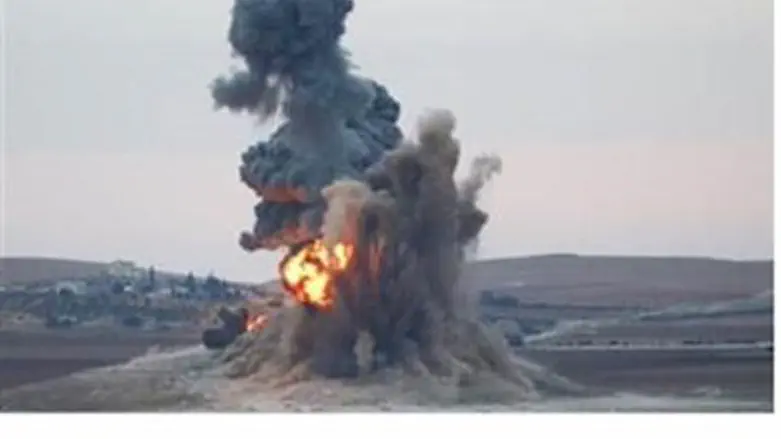
The Pentagon has announced that a senior ISIS member was killed today (Saturday) in an operation by US Special Operations forces in Syria. No Americans were killed or injured during the mission.
"The operation represents another significant blow to ISIL, and it is a reminder that the United States will never waver in denying safe haven to terrorists who threaten our citizens, and those of our friends and allies," said Defense Secretary Ash Carter.
The wanted man, Abu Sayyaf, organized the jihadist group's oil, gas, and financial arms. Oil provides a major source of ISIS's funding, with analysts estimating the group's oil revenue at up to $3 million per day.
As part of the mission, Sayyaf's wife, Umm Sayyaf, was captured. She is believed to have been involved in ISIS's activities, particularly human trafficking, and reportedly had a captured Yazidi woman as a slave.
This mission was authorized by US President Barack Obama, despite his earlier promise to keep all ground forces out of Syria and Iraq. Another Special Operations raid last year attempted to rescue kidnapped journalists, but all the hostages were killed.
White House national security spokeswoman Bernadette Meehan said Abu Sayyaf "was killed when he engaged US forces."
His wife was being held in military detention in Iraq.
The raid took place in Al-Omar, one of the largest oil fields in Syria, located in oil-rich Deir Ezzor province. Like much of Deir Ezzor, Al-Omar remains under ISIS control.
US Secretary of Defence Ash Carter called the operation a "significant blow" to ISIS.
Meehan said US forces based out of Iraq had conducted the raid "with the full consent" of Iraqi authorities.
US forces suffered no casualties, American officials said, without giving details on the number of troops involved.
Members of the elite Delta special operations unit descended on Sayyaf's compound in Black Hawk helicopters and Osprey tilt-rotor aircraft, a defence official told AFP.
In a firefight, US troops killed "about a dozen" armed terrorists, the official said, on condition of anonymity. At one point, fighting took place "at very close quarters, and there was hand-to-hand combat."
ISIS enters Palmyra
In central Syria, ISIS jihadists stormed and seized control of most of Palmyra's northern neighborhoods, the Syrian Observatory for Human Rights said.
"IS advanced and took control of most of northern Palmyra, and there are fierce clashes happening now," said Rami Abdel Rahman, the monitoring group's director.
The official Syrian news agency SANA quoted a military source as saying regime forces had prevented IS fighters from seizing a hilltop southwest of the Islamic citadel.
The head of Syria's antiquities department, Mamoum Abdulkarim, meanwhile, voiced extreme concern for the UNESCO world heritage site, located to Palmyra's southwest.
"I am living in a state of terror," Abdulkarim told AFP in a telephone call.
He said ISIS "will blow everything up. They will destroy everything," if they enter the site, adding that many of Palmyra's artefacts, like elaborate tombs, could not be moved.
ISIS began its offensive on Palmyra on Wednesday and has since inched closer to the ancient metropolis, executing at least 49 civilians in two days, according to the Observatory.
Fearing the destruction of Palmyra, known as the "pearl of the desert," UNESCO has called on the UN Security Council to act in order to save one of the Middle East's historic treasures.
48 dead in air raids
Meanwhile, in northwest Syria, at least 48 civilians, including nine children, were killed on Saturday in regime air raids on Idlib province, the Observatory said.
It said the air strikes targeted rebel-held Idlib city and the towns of Saraqeb and Kafr Awid.
Also on Saturday, Turkey's defense minister said armed forces shot down a Syrian helicopter that had violated Turkish air space.
"A Syrian helicopter was downed that violated the border for a period of five minutes within a seven mile (11 kilometer) limit," Defense Minister Ismet Yilmaz said, quoted by the Dogan news agency.
Syrian state television had earlier indicated the aircraft was a drone and vehemently denied it could have been a manned aircraft.
In Iraq, ISIS fighters tightened their siege on the last government positions in Ramadi, west of Baghdad, a day after they seized the city's government headquarters.
Taking control of Ramadi would constitute the group's most important victory this year in Iraq, and would give the jihadists control of the capitals of two of its largest provinces.
Mosul, capital of Nineveh province, has been under ISIS control since the jihadists launched a lightning offensive in June 2014.
Anbar province, of which Ramadi is the capital, extends from the Syrian, Jordanian, and Saudi borders to the gates of Baghdad.
Military reinforcements have been sent to Ramadi and other parts of Anbar, local officials said, and Iraq's army and the US-led coalition have struck ISIS positions in the area.
